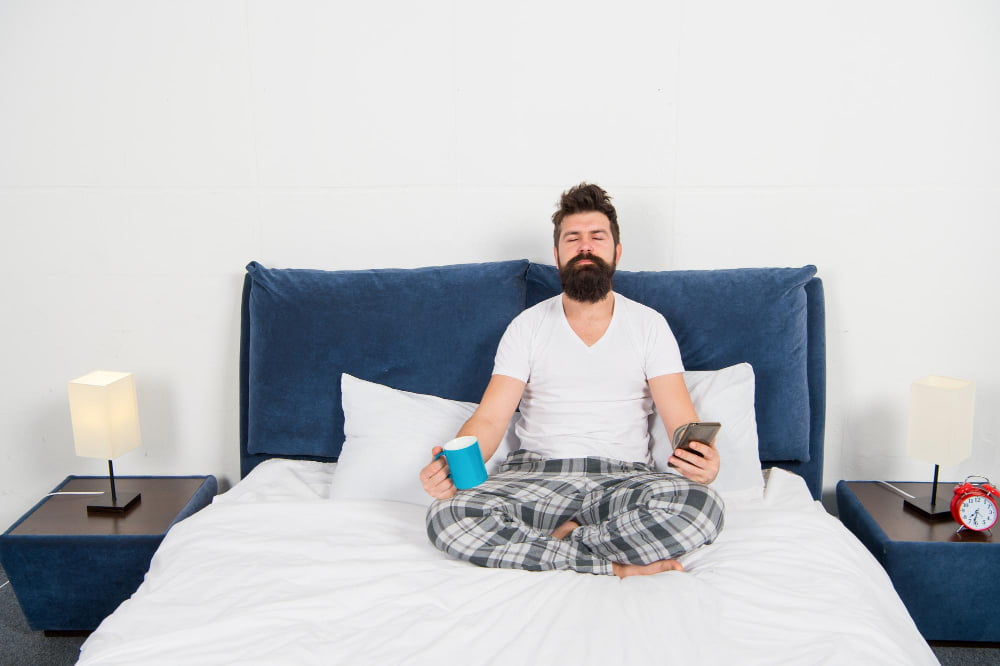Dive deep into understanding why meditating at night might not be ideal for everyone because specific reasons might just modify your meditation routine.
While meditation can be a powerful tool for relaxation and stress relief, practicing it at night might not always be the best choice for everyone. The tranquil state achieved during meditation can interfere with the sleep-wake cycle, leading to insomnia or fragmented sleep. Additionally, certain meditation techniques can bring up intense emotions or thoughts, which could potentially disrupt a peaceful night’s sleep.
This article will delve into the reasons why you might want to reconsider meditating at night, offering comprehensive insights into the science behind these effects and providing alternative times and strategies for effective meditation.
Key takeaways:
- Night meditation can interfere with sleep quality and disrupt the sleep-wake cycle.
- Intense meditation at night can increase mental alertness and hinder falling asleep.
- Nighttime meditation may disrupt the natural cognitive process of processing the day’s events, leading to disturbed dreams.
- Balancing meditation and essential rest is key for improved sleep quality.
- Proper timing and understanding of the potential effects of meditation can optimize its benefits and minimize disruption.
Impact of Night Meditation On Sleep Quality

Research shows meditation can help enhance sleep quality, by enabling the mind to achieve a state of inner peace and relaxation. Thus, the theory of meditating at night might seem an appealing one. However, it’s pivotal to understand the potential impacts.
Primarily, unless you’re practicing specific soothing methods, such as Yoga Nidra, intense meditation could lead to increased mental alertness. While this increased brain activity can be beneficial during daytime, at night it may disrupt your ability to fall asleep or maintain a deep sleep.
In addition, nighttime is typically when we process the day’s events. Intense meditation might interfere with this natural cognitive process, potentially leading to restless or disturbing dreams, consequently affecting sleep quality.
However, it’s important to comprehend the potential benefits and drawbacks of nighttime meditation, and adjust the practice according to personal sleep patterns and susceptibility. This can ensure a balance between mindfulness and necessary restful sleep.
The Balance Between Meditation and Essential Nightly Rest

Maintaining a balance between practicing meditation and ensuring essential night’s rest can seem like a juggling act. Both practices are a pathway to inner peace and wellness, yet they serve distinctive purposes.
1. Improved Sleep Quality: Proper sleep plays a crucial role in overall well-being and daily functionality. Chronic sleep deprivation can lead to significant health problems. Thus, striking a balance is key.
2. Enhancing Restorative Sleep: While meditation does help establish a calm mind, timing matters. Meditating close to bedtime may interfere with the natural winding down process, disrupting restorative sleep.
3. Meditation and REM Sleep: Meddling with the natural onset of Rapid Eye Movement (REM) sleep by meditating too close to the time may affect mental health negatively over time.
4. The Role of Melatonin: Night meditation can disrupt the body’s natural melatonin production, a hormone regulating the sleep-wake cycle.
5. Disturbance of Sleep Pattern: Those who meditate during the night may unintentionally disrupt their sleep pattern causing less energy and focus during the day.
Strategically scheduling your meditation practice can mitigate such potential problems while still allowing you to glean the profound benefits of mindfulness.
Meditation Timing and Its Potential Effects

While selecting a time for meditation, one must consider the potential effects it could have on daily routine and overall well-being. Firstly, an individual’s alertness dominates in mornings due to the rise of cortisol, a hormone that kickstarts the body’s function. Meditating during this time serves as a great start to the day, priming the brain for the tasks ahead.
On the other hand, evenings tend to be a time of relaxation and winding down, a more introspective period where the body is preparing itself for sleep. Meditating now could disrupt this natural progression and lead to difficulty sleeping. Hence, while nighttime meditation can provide relaxation after a stressful day, it may interrupt the body’s routine if not practiced correctly.
In addition, some types of meditation, such as stimulating Kundalini practices, can energize the practitioner and make it difficult to fall asleep if performed late in the day. Therefore, understanding the nature of the meditation practice and aligning it with one’s natural body rhythms can optimize the benefits and minimize potential disruptiveness.
Effects of Yoga Nidra At Night

As a form of meditative yoga, Yoga Nidra can appear attractive for night practice due to its calming and sleep-inducing qualities. However, some considerations need to be made regarding the probable effects on sleep if conducted incorrectly or too close to bedtime.
1. Improved Sleep Quality: Properly practiced Yoga Nidra can enhance sleep quality. It allows a deeper state of calm and relaxation, preparing your mind and body for a restful night.
2. Potential Disruption to Sleep-Wake Cycle: Late-night practice, especially if it lasts longer than expected, may interfere with the body’s circadian rhythm due to the similarity between the state achieved in Yoga Nidra and a night’s sleep.
3. Requires Proper Technique and Timing: The practice requires specific postures and breathing techniques, which if done improperly, could unintentionally stimulate the body and disturb the relaxation process or delay sleep onset.
4. Appropriate for Sleep Disorders: It can serve as a non-pharmacological treatment for sleep disorders like insomnia but should be done under trained supervision to ensure benefits outweigh any potential detriments.
These points reveal that balancing the potential benefits and detriments of Yoga Nidra at night requires conscientious practice and attention to individual needs and responses.
Breathing Meditation Before Bed: True Relaxation or Hindrance?

Let’s delve deeper into the concept of breathing meditation and its effects when practiced before bed. The focus here is on controlling your breath, followed by releasing thoughts that may lead to stress or anxiety. While some find this form of meditation calming, aiding in a tranquil transition into sleep, it’s not universally beneficial. Here’s why:
- Activation of the Parasympathetic System: Breathing meditation can stimulate this part of your nervous system, responsible for ‘rest and digest’ functions. This could, in turn, make you feel more active and alert, which is counterproductive when you’re trying to sleep, leading to insomnia.
- Over Concentration: For highly driven individuals, meditation might push one into a state of over focussing, leaving them feeling more energized than relaxed.
- Sensitization to Disturbances: While attempting to maintain focus on the breath, one might become overly sensitive to external or internal disruptions which could persist when you are trying to fall asleep.
The final effect of breathing meditation before bed varies from person to person, depending heavily on their psychological makeup and environmental circumstances. It’s important to gauge these factors before deciding on incorporating this practice into your bedtime routine.
Exploring Other Benefits and Detriments of Nighttime Meditation

While the potential hindrance to sound sleep is a major concern, nighttime meditation does come with its unique benefits. One significant advantage is the power to relieve the accumulated stress of the entire day. Meditating at night can help you process and release any negativity or tension accumulated during your daily activities, making it a therapeutic method for promoting mental wellbeing.
On the flip side, the tranquility of the night may potentially exacerbate distractions for some individuals. The quiet might amplify internal noise or the day’s residual thoughts, potentially disturbing the quality of your meditation. Moreover, with the day’s fatigue, there’s a higher likelihood of falling asleep during the practice, diverging from the intended mindful awareness and relaxation.
Night meditation might also interfere with your sleep schedule, especially if you use it to combat insomnia but end up staying awake later than you intended. This could potentially disrupt the balance of your sleep-wake cycle, leading to long-term sleep issues.
However, it’s crucial to remember that everyone’s experience with meditation is unique. While some might find drifting between meditation and sleep disruptive, others might consider it a seamless, calming transition. So, understanding your own response to nighttime meditation is key.
Guidance for Optimizing Night Meditation Practice

Easing into a regular meditation routine during the evening hours takes consideration and practice. Here are some strategies to optimize this process, avoiding the potential pitfalls:
1. Time your practice: Align meditation with your personal body clock. Your body’s unique circadian rhythm will determine the optimal timings for meditation.
2. Light exercises: Before meditating, perform light exercises to induce a relaxed state, reducing the likelihood of sleepiness.
3. Manage your environment: A quiet, dimly lit place generally encourages better focus. Ensure minimal disruptions to maintain a peaceful vibe.
4. Meditation type: Choose a less intense meditation form. These types focus on gentle breathing or peaceful imagery and are less likely to interrupt sleep patterns.
5. Keep it short: Limit your meditation time. Shorter sessions can be effective without causing drowsiness.
Remember, the key lies in personalization. What works for one person may not work for you. Experiment, adapt, and find the perfect balance to optimize your night meditation practice.
FAQ
Is it good to meditate at night?
Indeed, meditating at night is beneficial as it aids in faster sleep onset, enhances sleep quality, and diminishes anxiety, depression, and discomfort levels.
What are the dark effects of meditating at night?
Meditating at night, though beneficial for many, can potentially lead to bouts of depression, anxiety, confusion, disillusionment, and loss of interest in life for a minority of individuals, as indicated by certain studies.
Which time is not good for meditation?
Meditating right before bedtime is not recommended as it can interfere with the wakefulness cultivated during the practice.
What are the potential dangers of meditating before going to sleep?
Meditating before sleep may potentially lead to difficulty in falling asleep, especially for beginners, as it can energize the mind instead of relaxing it.
How can nocturnal meditation impact your sleep cycle?
Nocturnal meditation can enhance your sleep cycle by reducing stress and anxiety, promoting relaxation, and increasing melatonin levels for healthier, deeper sleeps.
Is it counterproductive to practice mindfulness exercises at night?
No, practicing mindfulness exercises at night is not counterproductive; in fact, it can enhance relaxation and improve sleep quality.